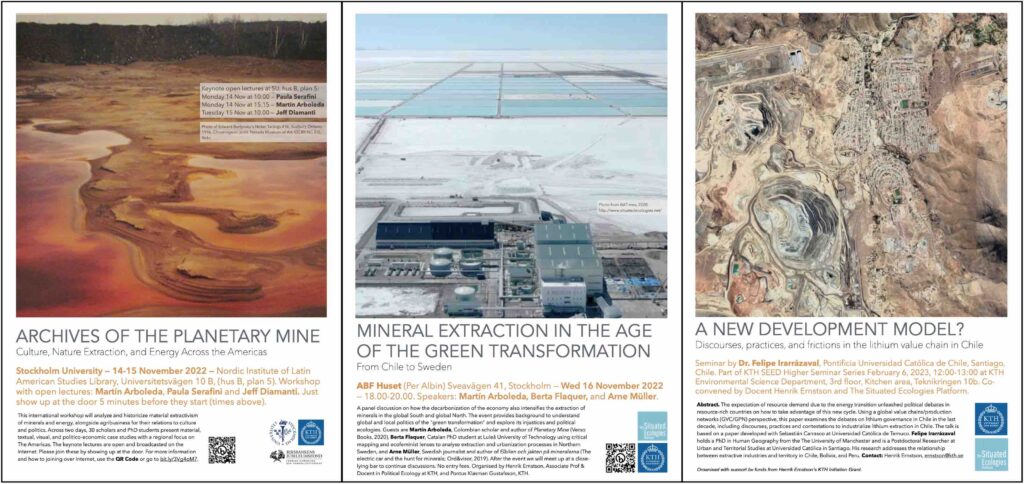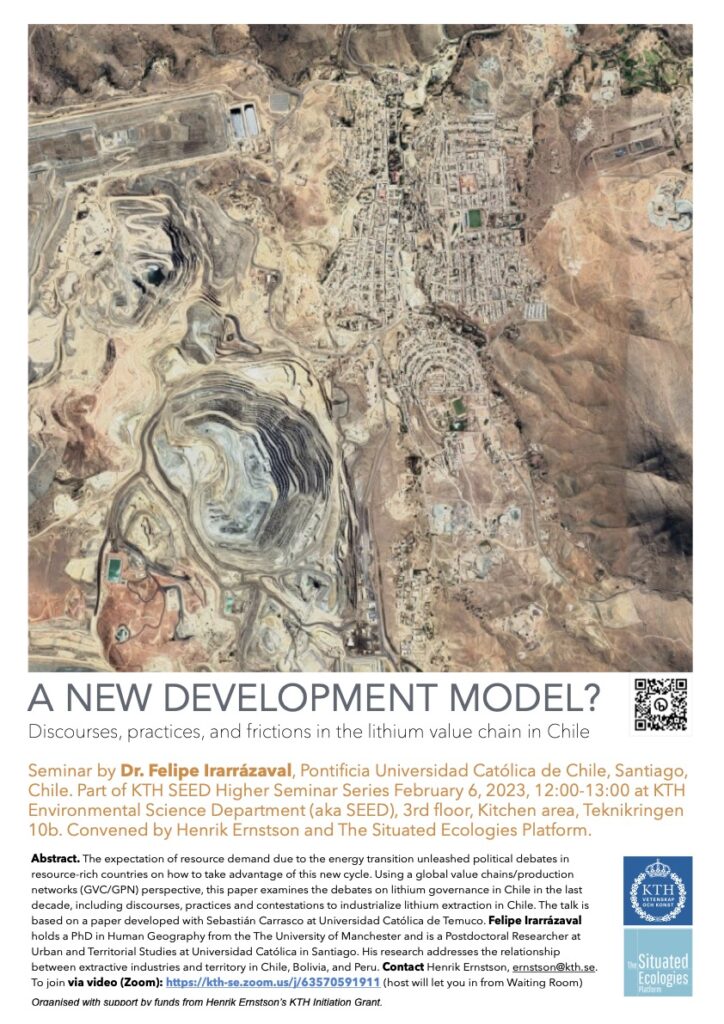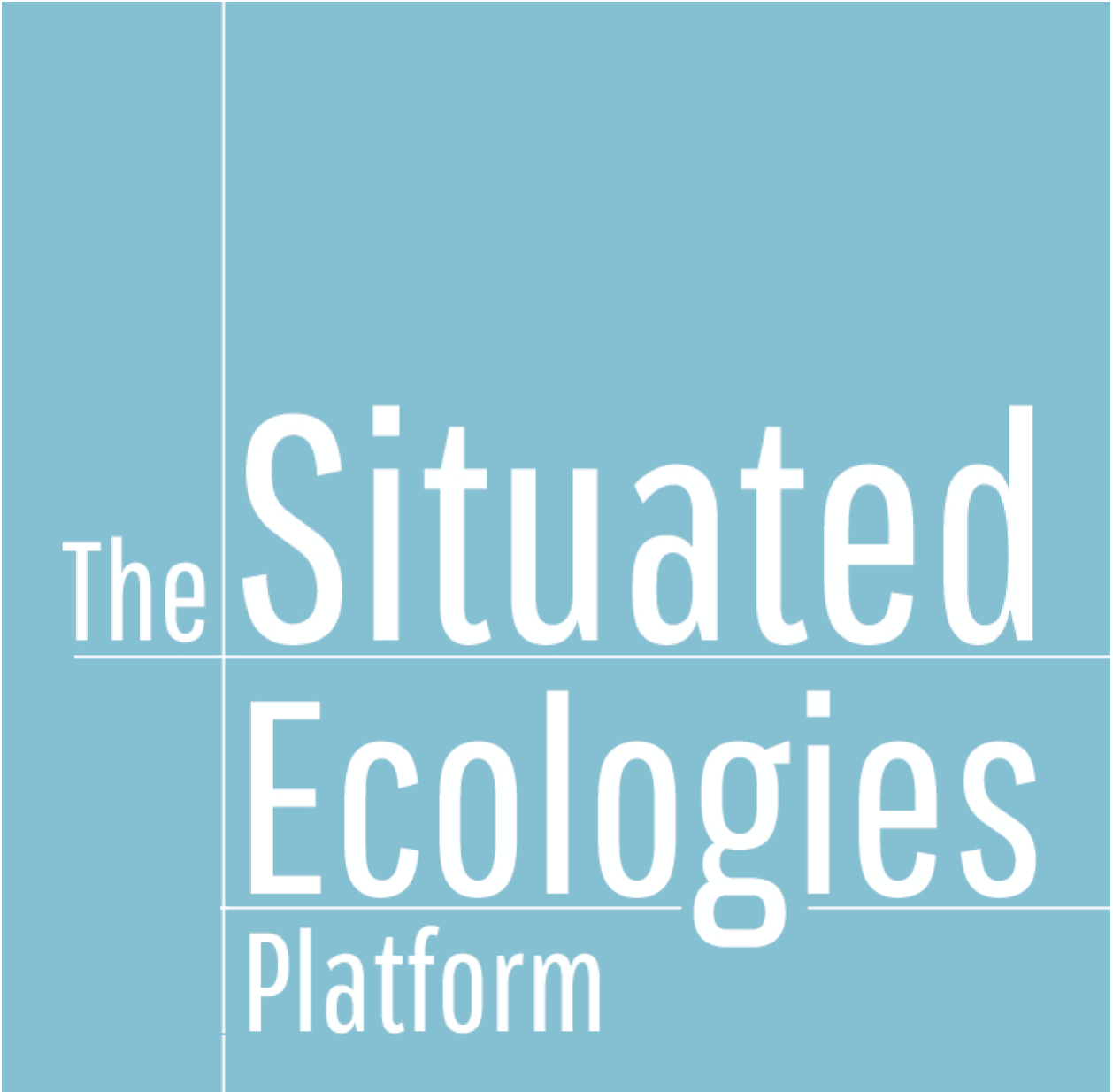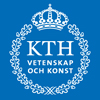
FELIPE IRARRÀZAVAL from Pontificia Universidad Católica de Chile will on Monday 6 February 2023 give a talk at our KTH SEED Higher Seminar Series in Stockholm (via ZOOM https://kth-se.zoom.us/j/63570591911). Using a political ecology framework and drawing on his field work in Chile, he will speak on the topical issue of lithium extraction in Chile and how value is captured from this new “white gold” of Latin America and highlight the social, environmental, and labour consequences of this mineral extraction. In particular he will interrogate the governance of lithium in the context of Chile but also help us ground and better appreciate the material and geographical foundations of e-mobility and aspirations of low-emission urbanization that have become increasingly strong policy discourse in face of global warming and climate change.
The talk forms part of a series of meetings and events that Situated Ecologies is organizing in 2022 and 2023 on what could loosely be called the political ecology of the green transformation. The series gathers empirical case studies and socioenvironmental narratives of uneven development, but also seeks to clarify a necessary vocabulary and theoretical framework to understand winners and losers and landscape and ecosystem change in our contemporary and dynamic moment. OTher events have included “Archives of the Planetary Mine” at Stockholm University and “Mineral Extraction in the Age of The Green Transformation” at ABF-huset in Stockholm.
The talk with Felipe Irarrázaval will follow the normal procedure and we will meet in the Kitchen area (open space) on the 3rd floor on Teknikringen 10b here at the Environmental Science Department at KTH in Stockholm (aka SEED). It will also be broadcasted online via zoom. Please contact me Henrik Ernstson for registration in advance if you are joining online.

Details of talk and biography of Felipe Irarrázaval
Title: A New Development Model? Discourses, Practices, and Frictions in the Lithium Value Chain in Chile
Felipe Irarrázaval, Pontificia Universidad Católica de Chile, Santiago, Chile
Date and time: 2023-02-06 (12:00-13:00 – CEST) // Venue: 3rd floor, Kitchen area (open space), Teknikringen 10b // Online: To join via video (Zoom): https://kth-se.zoom.us/j/63570591911 (host will let you in from Waiting Room)
Abstract: The expectation of resource demand due to the energy transition unleashed political debates in the resource-rich countries regarding how they might take advantage of this new cycle. This paper examines the debates on lithium governance in Chile in the last decade, particularly scrutinizing the discourses and practices to industrialize the lithium extracted in Chile and discussing how those initiatives are contested within the country. For doing so, this paper stands on the global value chains/production networks (GVC/GPN) perspective to examine the geographical expressions of economic and social upgrading in the lithium value chain, as well as to unveil another mechanism of value capture, such as resource rents. From such a perspective, the contribution unpacks how the contingent geographical arrangements of value distribution in the lithium value chain trigger frictions among sub-national actors seeking to redefine the position of places and regions in the value chain, as well as to challenge the distribution of the benefits related to lithium extraction. The central argument of the article is that lithium industrialization moved slowly seeking to finance emergent initiatives of research and development for carbon neutral technologies, seeking to include mining regions in those initiatives. However, those initiatives barely have consolidated value-adding processes in the manifold low-carbon technologies depending on lithium. As such, discourses of a new development model based on socio-technical imaginaries are far from becoming a suitable development strategy, and the main changes rely on new arrangements of value distribution. The talk is based on a paper developed between Felipe Irarrázaval and Sebastián Carrasco at the Department of Sociology at Universidad Católica de Temuco, Chile.
Keywords: Urban transitions, lithium extraction, battery production, uneven development, extraction governance
Bio: Felipe Irarrázaval is a Postdoctoral Researcher at Pontificia Universidad Católica de Chile in Santiago. He is also an Adjunct Professor at the Institute for Urban and Territorial Studies. His research addresses the relationship between extractive industries and territory in Chile, Peru and Bolivia. Specifically, he studies how the relationship between industry, state, and sub-national politics affects the geography of extractive income distribution and its associated socio-environmental changes and political ecologies. He holds a PhD in Human Geography from the The University of Manchester and a Master in Political Science from the University of Chile and a Bachelor in Geography from University of Chile. — ResearchGate with publications — Linkedin — Profile.
Related recent publications:
Irarrázaval, Felipe (2022), Social protest at mining territories: Examining contentious politics at mining districts in Chile. Resources Policy 78. Published online.
Irarrázaval, Felipe (2022) Mobilising Rents: Natural Gas Production Networks and the Landlord State in Peru and Bolivia. Antipode. Published online.
The talk is organised by KTH SEED and The Situated Ecologies Platform with support by funds from Henrik Ernstson’s KTH Initiation Grant.




